|
|
|
Sort Order |
|
|
|
Items / Page
|
|
|
|
|
|
|
| Srl | Item |
| 1 |
ID:
120445
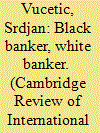

|
|
|
|
|
| Publication |
2013.
|
| Summary/Abstract |
Critical study of the 'global colour line' usually begins by observing similarities between the colonial-colonized relationship on the one hand, and the developed-developing relationship on the other. Despite the dramatic historical changes in human equality over time, both relationships are sometimes qualified with reference to race and racism. This article reflects on these continuities and changes via two debates in the philosophy of race: the 'onto-semantic' and the 'normative'. Each of these debates, I argue, can help international relations (IR) better understand the complex social meanings and political transformations of the global colour line. After I have made a case for the use of categories of racialization and racialized identity over the category 'race', I suggest that IR theorists, too, should pay more critical attention to the burgeoning literatures on racial habits and racial cognition.
|
|
|
|
|
|
|
|
|
|
|
|
|
|
|
|
| 2 |
ID:
120449
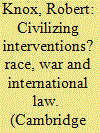

|
|
|
|
|
| Publication |
2013.
|
| Summary/Abstract |
Over the past decade there has been an explosion in literature on imperialism and international law. This scholarship has focused on the use of force, especially humanitarian intervention and the war on terror. These accounts foreground the issue of race, arguing that these legal arguments reproduce the dynamic of the civilising mission. This article argues that such analyses miss some key elements. Contemporary interventions must be counterposed to the First Iraq War, which was enabled through the uncontroversial authorization of the Security Council. Humanitarian intervention and the war on terror emerged in reaction to the fear that other states would veto Security Council resolutions. Consequently, the 'racial' discourse around intervention cannot simply be read as 'othering' the peripheries, but was also a response to inter-imperialist rivalry. The article then advances a conception of the arguments as an attempt to articulate hegemonic coalitions against emerging rivalries, and reads racialization in this light.
|
|
|
|
|
|
|
|
|
|
|
|
|
|
|
|
| 3 |
ID:
120444
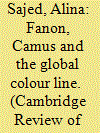

|
|
|
|
|
| Publication |
2013.
|
| Summary/Abstract |
I focus here on the political stances of Frantz Fanon and Albert Camus regarding the Algerian War of Independence. By examining their reflections on this violent anticolonial struggle, I seek to highlight the role of colonial difference and of racial hierarchies in the constitution of global politics. Fanon's position relies on an ethos of decolonization and on an ethics of difference that-while specific to the Algerian context-also reverberated profoundly among other societies caught in the violence of imperial encounters. Camus' conciliatory approach, however, and his moral equalization of the violence perpetrated by both sides enunciate the inherent racial hierarchies underpinning liberal narratives. I argue that the limits inherent in Fanon's thought-but also its latent potentialities for decolonial thinking-become apparent when examined through the lens of the contemporary activism among North African migrants and their descendants in France. The emergence of self-proclaimed decolonial movements constitutes an attempt to enact a decolonial transnational citizenship, which contests the racial boundaries of French Republicanism. But it also signals a different vision of the universal-one that is entrenched in a terrain of historical specificity and which holds more promise in contesting the global colour line.
|
|
|
|
|
|
|
|
|
|
|
|
|
|
|
|
| 4 |
ID:
120446
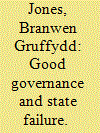

|
|
|
|
|
| Publication |
2013.
|
| Summary/Abstract |
Current international policy discourse routinely characterizes the condition of African states in terms of either 'good governance', on one hand, or 'fragility' and 'failure', on the other. This conceptual vocabulary and analytical approach has become entrenched within the public imagination more broadly, and is reproduced in academic analysis, largely without serious questioning or critique. Some scholars, however, have argued that the entire discourse of 'state failure' should be rejected as a valid approach to understanding, analysis and explanation of social and political conditions in Africa. This position seeks both to demonstrate the analytical and explanatory emptiness of the conceptual framework of 'state failure', and to reject the uncritical adoption of strands of imperial discourse by academic scholars. This article contributes to this position by examining the failed state discourse as a modern form of racialized international thought. It argues that the discourse must be recognized as a contemporary successor to a much longer genealogy of imperial discourse about Africa and other non-European societies.
|
|
|
|
|
|
|
|
|
|
|
|
|
|
|
|
| 5 |
ID:
120447


|
|
|
|
|
| Publication |
2013.
|
| Summary/Abstract |
This article addresses the centrality of racism in international relations (IR) theory; specifically, in realism and liberalism, two of the most prominent paradigms of IR. It examines the extent to which these major paradigms of world politics are oriented by racist-primarily, white supremacist-precepts that inhere within their foundational construct, namely, anarchy. I maintain that due to the centrality of anarchy-and other racially infused constructs-within these prominent paradigms, white supremacist precepts are not only nominally associated with the origins of the field, but have an enduring impact on IR theory and influence contemporary theses ranging from neorealist conceptions of the global system to liberal democratic peace claims, and constructivist theses as well.
|
|
|
|
|
|
|
|
|
|
|
|
|
|
|
|
| 6 |
ID:
120448
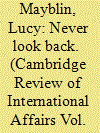

|
|
|
|
|
| Publication |
2013.
|
| Summary/Abstract |
The campaigns for the abolition of slavery in the British Empire, spanning over 40 years, represented one of the major political issues of the late Enlightenment, and drew in people of all backgrounds. The very idea of humanity was at stake and this was an issue of broad-based concern. For the abolitionists, the humanity of black slaves was not in doubt, it was the actions of a society who condoned the practice, active or passive, that they saw as inhuman. Against this backdrop, Enlightenment thinkers were working on theories of justice, rights and humanity which would have an enduring influence on politics, society and academic thought for hundreds of years to come. This article addresses this historical context which, it is argued, is vital in reading, interpreting and applying Enlightenment thought in international relations today. The article presents primary and secondary historical evidence to this end and proposes that Spivak's conceptualization of 'sanctioned ignorance' offers much for understanding how it can be that European political thought has been so divorced from the context of slavery, from whence it emerged.
|
|
|
|
|
|
|
|
|
|
|
|
|
|
|
|
| 7 |
ID:
120443


|
|
|
|
|
| Publication |
2013.
|
| Summary/Abstract |
Questions of race and racism have haunted the imagination of international relations (IR) since its inception. The essays in this special section probe assorted dimensions of the story, elucidating important though often overlooked ways in which racial difference is figured in global politics.
|
|
|
|
|
|
|
|
|
|
|
|
|
|
|
|
| 8 |
ID:
120451
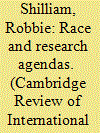

|
|
|
|
|
| Publication |
2013.
|
| Summary/Abstract |
In this afterword I consider a set of questions related to the research agendas of race in International Relations. What are our narratives of race and racism? Whom do we follow in order to tell the tale: the masters or the enslaved-the humanitarians or the 'sufferers'? And which tale confesses the episteme-the scientifically valid study-of race?
|
|
|
|
|
|
|
|
|
|
|
|
|
|
|
|
| 9 |
ID:
120450


|
|
|
|
|
| Publication |
2013.
|
| Summary/Abstract |
Though race is most commonly associated with domestic politics, the concept itself was born in the transnational realm. This article conceptualizes race as a system of global power relations that has changed over time, manifests differently across space and exists on multiple analytical levels. Drawing from the insights of international relations, comparative politics and critical race theory, it argues that race is a transnational norm or idea that can independently affect both domestic policy outcomes and international relations among nation-states. The article explores several promising avenues of research in the examination of the varied manifestations of race in international and domestic realms and ends with a brief discussion of continuing challenges and future research agendas in the comparative and international study of race.
|
|
|
|
|
|
|
|
|
|
|
|
|
|
|
|
|
|
|
|
|